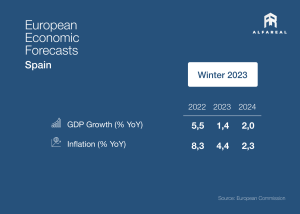The European economy has avoided a recession, but the latest inflation forecasts for Spain and Europe in 2023 indicate that it will continue to be one of the main concerns of society. In this article, we will analyze the latest inflation forecasts and their possible consequences. What is the inflation forecast for next year in Europe?
According to the winter economic forecasts of 2023 published by the European Commission on February 13, 2023, it is expected that inflation in the eurozone will remain above the European Central Bank’s (ECB) target of 2% in 2024 and reach 2.5% (after 8.4 % in 2022 and 5.6 % in 2023). Inflation in Spain is expected to be at 2.3% in 2024(after 8.3 % in 2022 and 4.4 % in 2023).
The European Commission also warned about the risks that the European economy faces in 2023. Political uncertainty and trade tensions are two of them. The increase in oil and energy prices worldwide has undoubtedly heightened inflation across Europe. In this regard, inflation in the eurozone will remain above the ECB’s target partly due to the rise in energy prices, but also because of the economic recovery.

Bankinter has also published forecasts for inflation in Spain in 2023. According to their report published on March 22, 2023, inflation is expected to moderate in the coming months. Inflation in Spain is projected to be at 4.6% at the end of 2023, decreasing as the effects of rising energy prices diminish.
According to the Bank of Spain and its latest report published by Europa Press in late March this year, food inflation is also rising and expected to continue increasing in the following months. The increase in food prices in Spain is caused by a combination of factors, such as global food price inflation and disruptions in supply chains due to the COVID-19 pandemic, which still has negative effects on the global economy.
How much will the Euribor rise in 2023?
It is not possible to accurately predict how much the Euribor will rise in 2023. As a daily reference index, its evolution cannot be forecasted because it depends on numerous factors. These factors include changes in the monetary policy of the European Central Bank (ECB), such as interest rate changes, as well as how economic conditions in Europe and the rest of the world evolve. Tensions with Russia and the rest of Europe also affect the economic landscape, and uncertainty about the war further destabilizes predictions.
Will the pension system collapse?
First, let’s understand how the pension system works and how it is affected by inflation.
In Spain, the pension system operates as a public distribution process. Active workers pay the pensions of retirees through their contributions to the pension system. As time goes by and these active workers retire, they receive pensions that are financed by the next generation of active workers. In this sense, if there are periods of very volatile inflation, this system can be disrupted in different ways.
Firstly, inflation reduces the purchasing power of pensions. If inflation is high and the pension is not adjusted to compensate for that loss of purchasing power, pensions can be significantly reduced, which in turn worsens their quality of life. From a macro perspective, the financial balance of the public pension system can be affected if it does not have enough income to cover the increased costs.
In the long term, if inflation persists for a long time, it can weaken the value of the assets in the pension system, such as equity investments or government bonds. Therefore, it is important for the public pension system to take into account the effects of inflation and take measures to maintain the sustainability of pensions in an intergenerational manner.
According to data from the Social Security Administration, the average pension in Spain in March 2023 was 1,032.57 euros per month. The pension system in Spain faces several challenges, such as an aging population and a decreasing ratio between workers and pensioners. The system is not bankrupt now, but continuous effort is needed to ensure its sustainability.
If they are adjusted to the demographic and economic conditions in Spain and adequately funded, public pensions can be kept sustainable over time. However, this requires constant evaluation and policy adjustments as needed.
Conclusion
In summary, the latest forecasts from financial institutions for inflation in Spain and Europe in 2023 indicate that it will remain above the ECB’s and the Spanish government’s targets. However, inflation in Spain is expected to moderate in the coming months. While the positive impact this can have on the economy is good news, there are risks and trade tensions that can negatively affect the overall European economy.
Sources




